Shell companies have long been a tool used by criminals to launder dirty money and evade taxes. In recent years, the United States has ramped up efforts to crack down on the use of shell companies in Latin America as part of its larger strategy to combat money laundering in the region.
A shell company is a business entity that has little to no actual business activity or assets, but is used as a front to hide the true ownership of funds and assets. By hiding the true owners behind layers of fake identities, criminals can move illicit funds around the world with impunity, making it difficult for law enforcement to track and seize the proceeds of their crimes.
Latin America has long been a hotbed for money laundering, with corrupt politicians, drug cartels, and other criminal organizations using the region as a hub to launder their illicit proceeds. In recent years, several high-profile cases have brought attention to the issue, prompting the U.S. government to take action.
One of the key strategies the U.S. has employed to tackle the use of shell companies in Latin American money laundering is through greater transparency and regulation. The U.S. has implemented stricter reporting requirements for companies that operate in the region, requiring them to disclose the true owners of any shell companies they own or operate.
In addition, the U.S. has worked closely with Latin American governments to share information and intelligence on suspicious activities and transactions. By working together, law enforcement agencies in both the U.S. and Latin America have been able to track and seize illicit funds and assets, disrupting the flow of dirty money through the region.
One of the most high-profile cases of U.S. action against shell companies in Latin America was the 2017 arrest of former Panamanian president Juan Carlos Varela, who was charged with accepting bribes from Brazilian construction giant Odebrecht through a network of shell companies. Varela’s arrest sent shockwaves through the region and served as a warning to other corrupt politicians and criminals that their illicit activities would not go unpunished.
While the U.S. has made significant strides in tackling money laundering in Latin America, there is still much work to be done. The region continues to be a haven for criminal activity, and the use of shell companies remains a persistent challenge. However, by working together with Latin American governments and implementing stricter regulations and transparency measures, the U.S. is making progress in its efforts to combat money laundering and hold criminals accountable for their actions.





































































